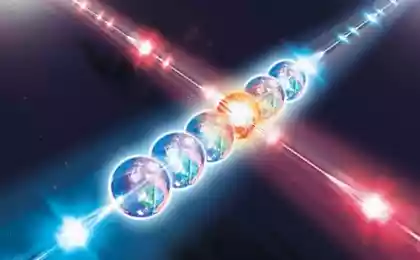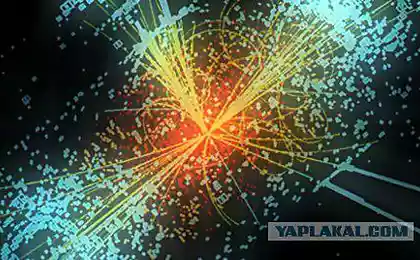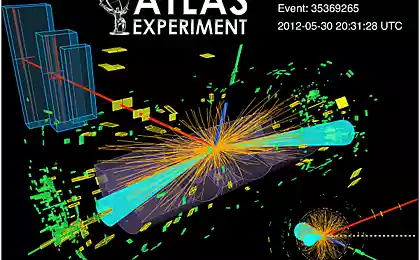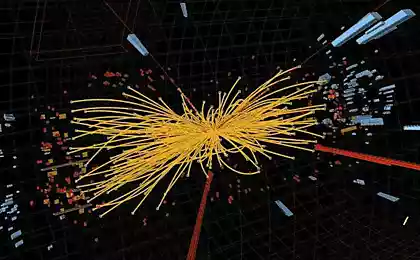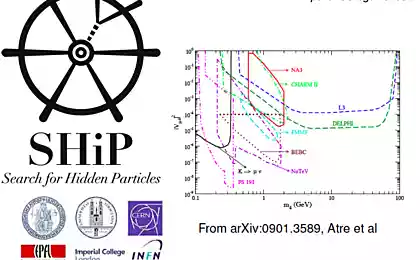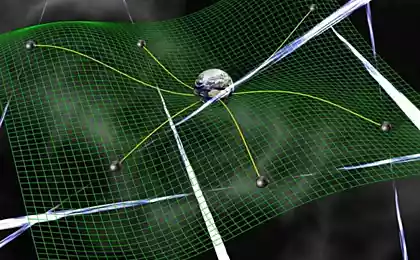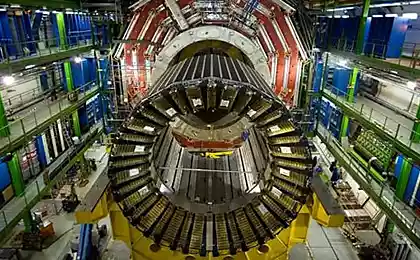1599
LPI staff talked about the search for the Higgs boson

July 4, 2012, in Geneva, the scientific seminar, which is summarized as follows him press conference. Guide CERN announced the summary results of the Higgs boson, obtained during the processing of the experimental data for the years 2011-2012. With a very high probability elusive particle is found.
About how there is a search for the Higgs boson, and what is the importance of the discovery, told the staff of FIAN involved in two major experiments of the Large Hadron Collider (LHC) - CMS and ATLAS.
As a result of the collision of protons colliding beams in the Large Hadron Collider was born many secondary particles. Among them, there is a relatively long-lived particles that can fly centimeters and meters, and there is short-lived, which is practically not having to move away from the point of birth, fall into other particles. Higgs boson - a very short-lived particles, it decomposes very quickly. Types of decay, or as they are called specialists, decay channels, pretty much. For example, in one case, God particle can decay into two Z-boson (which are further broken down into four lepton), in the other - on two gamma ray. This is a random process, so to predict in advance what the particles in each case the desired disintegrate boson, it is impossible.
"The detectors at the LHC can not register directly the Higgs boson, but its decay products that live long enough to be registered, they can. For example, leptons, which decay Z-bosons. However, and this is one of the main problems, the same particles into which the Higgs can be born as a result of completely different processes to the Higgs boson have nothing to do. And these processes much more than processes with the production and decay of the Higgs boson, "- says participant in the experiment ATLAS, a senior fellow at the LPI to Ph. D. n. Vladimir Tikhomirov.
However, when in the hands of archaeologists has found many years later, pieces of ancient vases or other strange things, they can restore its appearance. So here, having in the arsenal of the mass and energy of the particles - the decay products, scientists can restore parental mass particles from the decay of which they were formed. But then again snag. The fact that the theory under which predicted the existence of the Higgs boson (standard model), the mass of the Higgs does not predict.
The solution to this problem as follows. Scientists build the mass distribution of the particles, ie the number of events in which the particles are born with certain weights, recovery characteristics of possible decomposition products such pairs of gamma rays. Most of the events in this distribution are background, as most of the recorded pairs nothing to do with the Higgs boson has not. But if among all these pairs of gamma rays do have those that are the result of the collapse of the desired boson, then these pairs, up to the accuracy of measurements, each time will give the same weight. Then on the background distribution, composed of random events in the area of the required particle mass will experience a certain excess of events in the form of an additional peak.
The same distribution can be constructed for other possible decay channels of the Higgs boson. And if it is found to peak with the same value of the mass, as in the previous, it will testify in favor of explicit laws, for which it is likely lies Higgs boson. In order to determine how likely it is that we really have to deal with the decay products of the Higgs boson, but not with statistical fluctuations, use the theory of probability. To determine the reliability of the results scientists need to determine how likely you can randomly get the same excess of events in the form of an additional peak, beyond the background distribution.
The degree of statistical confidence in the results taken to indicate the number of so-called sigma, which characterize the scope of the probability distribution. The more Sigma, the less likely that the event will go beyond the random distribution. For example, for a 3 sigma this probability is about 0, 3%, that is, by chance is probably about three times out of a thousand. The result, worthy of trust in the scientific community agreed to consider only the result, which corresponds to 5 sigma and more. As for the Higgs boson, according to the results of the experiments presented jointly by the CMS and ATLAS, the probability that an excess of events in the same mass region will be randomly obtained as a result of the data on the decay of both the two Z-boson and two gamma -quantum less than 6.10, which corresponds to 5 sigma. The most probable value of the Higgs boson mass is about 126 GeV 5 - according to the collaboration ATLAS, and 125 ± 3 0 6 GeV - according to the CMS.
"The importance of the discovery of the Higgs boson is determined by the fact that it is - the only one not yet found particles in the so-called Standard Model, which describes the interaction of all the known particles in the universe. Moreover, it plays a special role in determining the mass of all other particles moving in the Higgs field. Thus, there is an explanation of the puzzle so different masses, from neutrinos and ending with the top quark, "- says party collaboration CMS, chief researcher at the Lebedev Physical Institute, Dr. Ph. D. n. Igor Dremin.
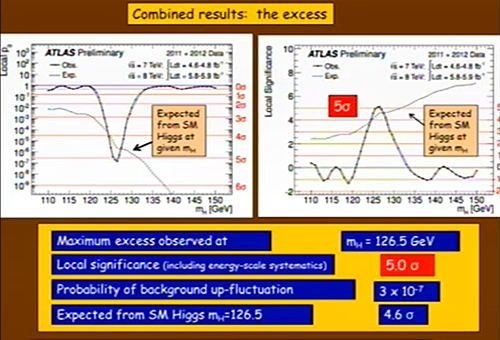
Slide presentation of the representative of the ATLAS collaboration Fabiola Gianotti.
What's next?
In 2013, the Large Hadron Collider will suspend its work for about one and a half years. During this long break will be the preparation of a giant machine to transition to the total energy (14 TeV into two beams) and the total luminosity. The subsequent launch of the collider at full capacity, it will study in detail the properties of the particles found: specify weight, to determine the probability of decay through various channels, and others. The great interest and also represents the search for other, not included in the standard model of hypothetical particles predicted by some theories. So it is possible that the discovery of the Higgs boson - is only the first step in a series of fundamental discoveries that will bring the LHC experiments.
In the planetary system mysteriously disappeared gas-dust disk
American scientists have refused to believe in the existence of mermaids
